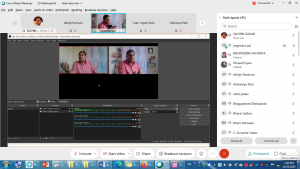 The Department of Electronics & Communication Engineering, Institute of Technology, Nirma University organised online Short Term Training Programme (STTP) on ?Digital Era Tools for Teaching, Learning and Research? during November 23-27, 2020. The Gujarat Council on Science & Technology (GUJCOST) sponsored the five-day online STTP through the WebEx platform. The experts from the reputed Academic Institutes and Research Organisations conducted all the sessions in this programme. Dr Dhaval Pujara and Dr Sachin Gajjar from the Department of Electronics and Communication Engineering coordinated the STTP. During the programme, apart from the lectures by the experts, there were hands-on sessions on various ICT tools on teaching, learning and research. The following experts were the resource persons who conducted sessions in the STTP:
The Department of Electronics & Communication Engineering, Institute of Technology, Nirma University organised online Short Term Training Programme (STTP) on ?Digital Era Tools for Teaching, Learning and Research? during November 23-27, 2020. The Gujarat Council on Science & Technology (GUJCOST) sponsored the five-day online STTP through the WebEx platform. The experts from the reputed Academic Institutes and Research Organisations conducted all the sessions in this programme. Dr Dhaval Pujara and Dr Sachin Gajjar from the Department of Electronics and Communication Engineering coordinated the STTP. During the programme, apart from the lectures by the experts, there were hands-on sessions on various ICT tools on teaching, learning and research. The following experts were the resource persons who conducted sessions in the STTP:
The objective of the workshop was to provide an introduction to the Information and Communication Technology (ICT) tools that can be integrated into teaching-learning and research for faculty of higher education. The key focus of this programme was to familiarize the participants with the ICT that help them: (i) design and present effective course material and plan classroom and laboratory activities, (ii) create 24×7 participative learning environment for students, (iii) create an independent, self-paced, student-centric learning environment, (iv) effectively manage and enhance research productivity. Importantly, the hands-on session on latex and developing virtual laboratory were conducted interactively to give a start to participants in the field of creating virtual laboratory and creating documentation and presentations using Latex.
The registration of the workshop was open for the faculty members from Universities, Colleges, and Polytechnics and PhD scholars across the nation. The 56 participants were from several reputed institutes across the country, like Tilak Maharashtra Vidyapeeth, Pune; Ayya Nadar Janaki Ammal College, Sivakasi; Punjab Agricultural University, Ludhiana; Dharmsinh Desai University, Nadiad; Ahmedabad University; Government Engineering College, Valsad; Government Polytechnic, Vyara; Indian Maritime University; Pandit Deendayal Petroleum University to name a few.
Formal and informal feedback taken at the end of the workshop got a positive response. The participants also requested to organise more such programs in the future.
The content covered in the webinar was as follows:
All the participants, who attended all the sessions were issued certificates.